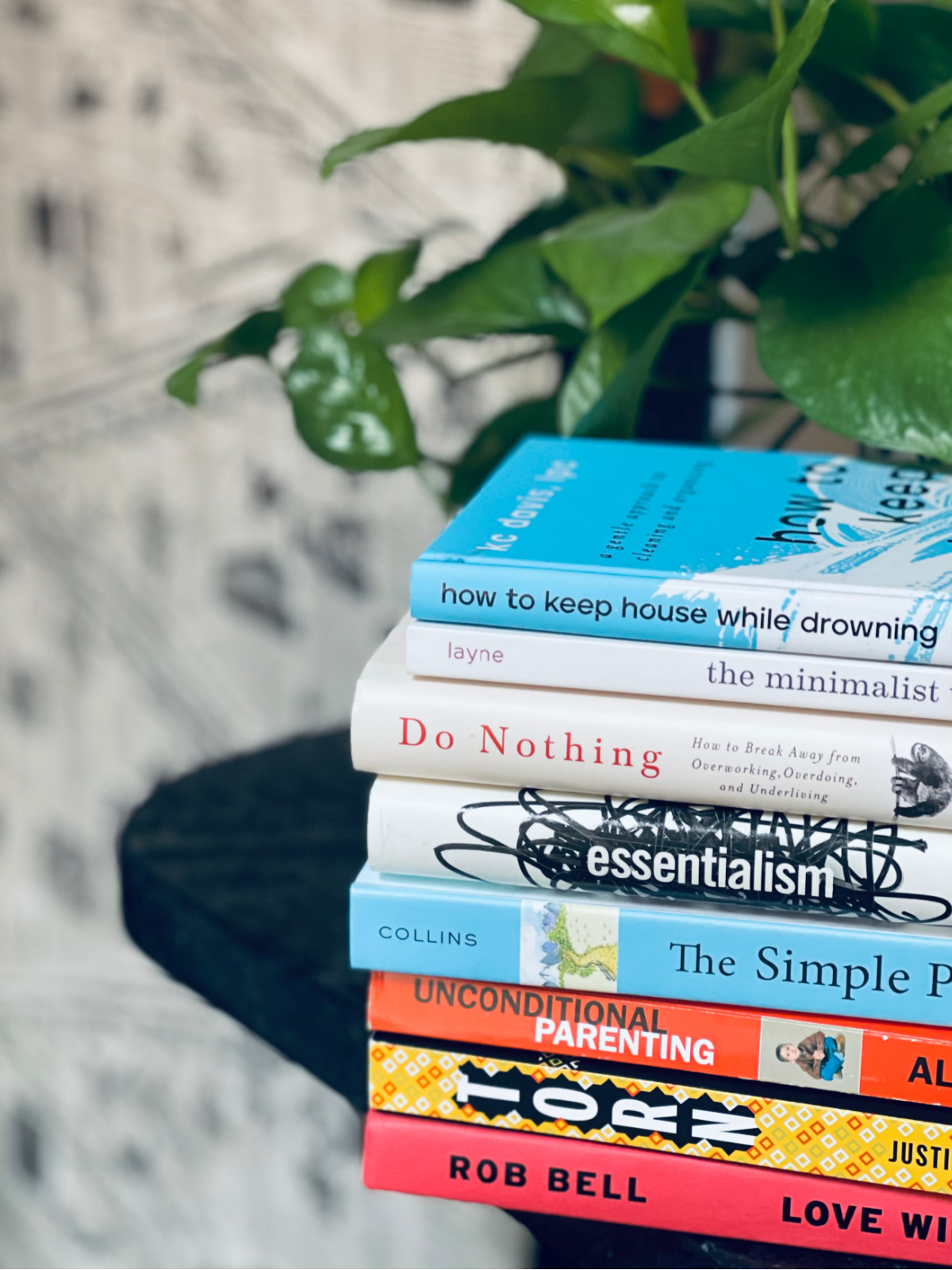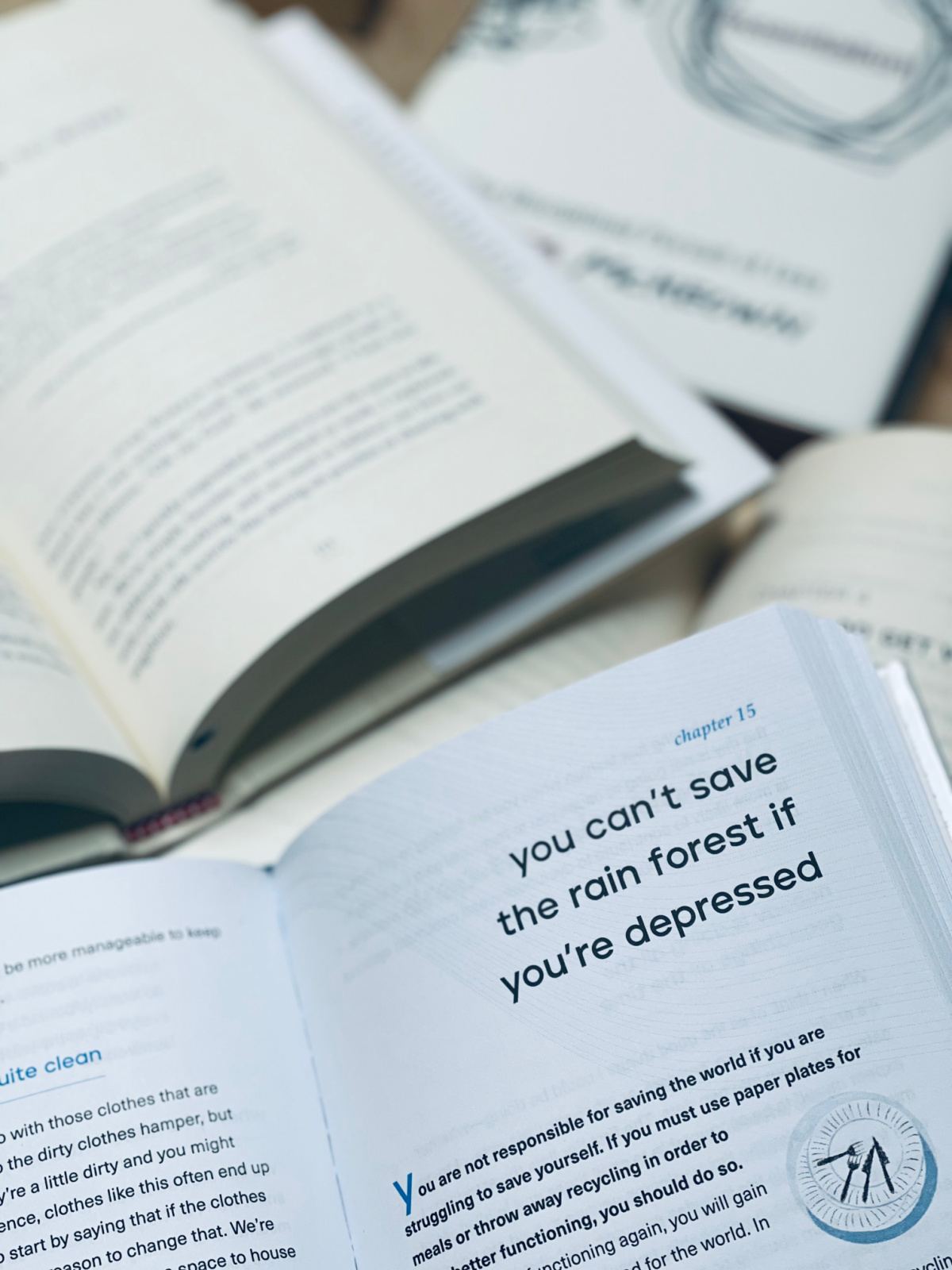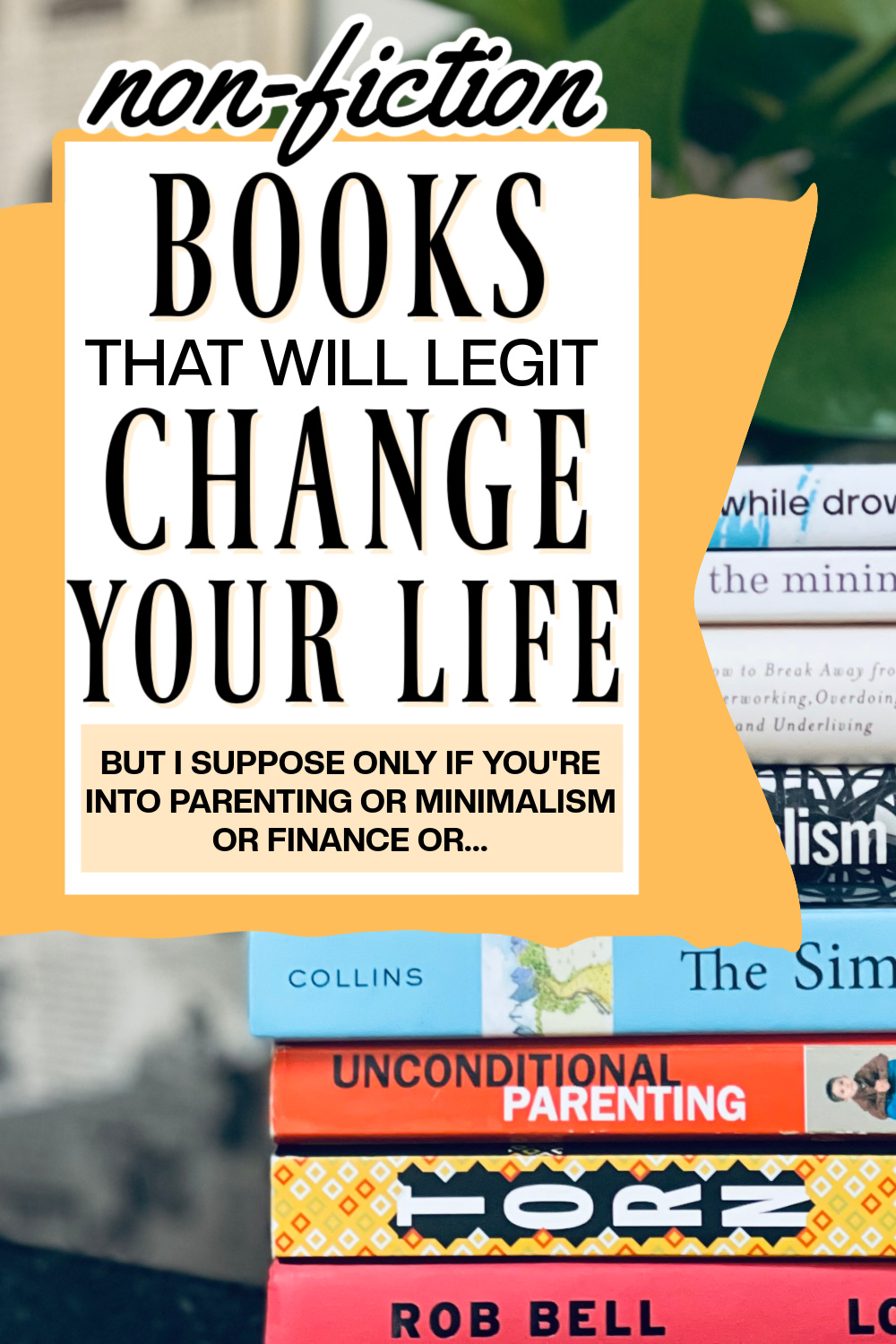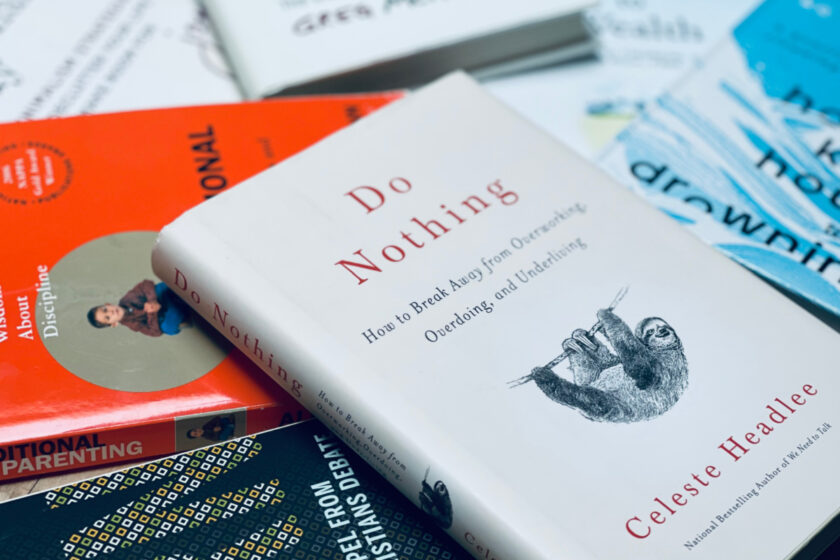Inside: If topics like minimalism, parenting, faith deconstruction or personal finance interest you, you might find your next transformative book on this list of my own life-changing non-fiction books.
Graduations. Anniversaries. Birthdays. Meh. I’m not all that into holidays, either.
Sorry, Hallmark.
I’d much rather commemorate the days I discovered life-changing ideas thanks to incredible books any day of the week (got any cards for that?).
I’ll never forget the day I discovered The Life-Changing Magic of Tidying Up on Modern Mrs. Darcy, for instance. I can picture the apartment we were living in, where I was sitting, and the relief I felt when I encountered the simple solution to my organizing/tidying exhaustion: own less stuff.
Or the day I heard about an unschooling manifesto while reading a blog post on Simple Homeschool. It took a while for me to get fully on board with the whole unschooling thing, but that one little book started it all.
Non-fiction books have introduced me to so many life-altering ideas like…
- minimalism
- unschooling
- respectful parenting
- faith deconstruction
- the FIRE movement
I sure hope the world is wrong about video eventually replacing books (and blogs, for that matter) because there are some ideas that are communicated so much better through 40K+ written words.
(Preferably printed on actual paper because even though I’m a minimalist, and I’ve tried really really hard to love Kindle, it’s never gonna happen. Team Physical Books for life!)

17 Life-Changing Non-Fiction Books
This post probably contains affiliate links, which means I may earn a commission if you make a purchase through those links. As an Amazon Associate, I earn from qualifying purchases. You can find our full disclosure HERE.
As a kid, I devoured fiction like it was my job. I was the bookworm who didn’t socialize all that much after learning how to read.
My parents had to convince me to stop reading and play LEGOs with my brother, already. Funny, it sounds just like parents today worried about kids alone on screens, but I digress.
Now that I have five kids of my own, my reading time is pretty limited. I do read aloud fiction to my kids, but for my own reading time, I tend to prefer non-fiction, and almost all of the books I would consider to be “life-changing” fall into that category (with the exception of THIS book).
There’s just so much to learn! So many potentially powerful new ideas to consider.
So here are my top 17 life-changing non-fiction books from the past several years. Let’s dive in.
1. The Life-Changing Magic of Tidying Up

Marie Kondo’s trendy little book was my first introduction to minimalism.
Her decluttering methods aren’t for everyone, but they did get me started. Decluttering gave me the space and peace of mind I needed to homeschool and start this blog, which now means extra income for our family.
Thank you, Marie Kondo!
You Might Also Like: 12 Best Decluttering Books for a Clutter-Free Home
2. The Minimalist Way

I can’t mention minimalism without also recommending Erica Layne’s book The Minimalist Way.
Her unique focus on clarifying values before diving into minimalism helped me choose my own core values. Now I frame everything I do, all the choices I make, around my three core values: simplicity, freedom and meaningful work.
(Top competitor for this slot? Slow by Brooke McAlary. Also excellent!)
Related: 7 Best Books on Minimalism & Simple Living (I’ve Read 90% of Them)
3. An Unschooling Manifesto
Marla Taviano’s book an unschooling manifesto was my first introduction to unschooling. Her candid questions about children and learning and education made me feel less alone for asking the same questions.
If a former school teacher was coming to similar conclusions about education that I was, I couldn’t be that far off, right? I must have read this book ten times in those first few years of homeschooling.
Note: the original version has a LOT of Christian/spiritual references. Marla is currently working on an updated version to reflect her post-faith-deconstruction beliefs.
4. Free to Learn

While Marla’s book was the perfect introduction to unschooling (for me, at least), developmental psychologist Peter Gray’s Free to Learn filled in a lot of the holes.
Having a Boston College psychology professor with a Ph.D. say, “Please unschool your kids!” boosted my confidence in self-directed education.
His qualitative research shows all the ways children in non-traditional and non-modern settings learn everything they need to know through play. If you’re at all interested in unschooling, I can’t recommend this book highly enough.
(Naomi Fischer, also a psychologist, recently released her book Changing Our Minds, with even more evidence-based support for unschooling. Another great read!)
You Might Also Like: 12 Best Unschooling Books for Rethinking Education
5. The Feminine Mistake

All of my ideas about motherhood came from evangelical Christianity. Those included staying home with your kids, not working (other than doing Christian ministry) and trusting that your husband would provide for your family.
Reading The Feminine Mistake opened my eyes to just how many things can go wrong with that scenario.
From unexpected death to divorce to disability, Leslie Bennetts explores all the reasons for women to continue working at least part-time throughout motherhood. And if you do want to take a set amount of time off, she offers suggestions for how to do so without hindering your long-term career or earning potential.
6. Love Wins

Love Wins met me in a place of deep confusion and borderline depression in the middle of a faith crisis. Rob Bell examines traditional church doctrine and theology around heaven and hell, much of which isn’t even biblical.
Did you know the word “hell” isn’t even in the Bible?! How’s that for mind-blowing?
Letting go of hell – eternal punishment for finite crimes (something that didn’t align with the loving, just and good God I believed in) – gave me peace of mind I needed to wrestle with all of my other theological questions at my own pace.
7. Jesus and John Wayne

When Trump got elected mostly due to support from evangelical Christians in 2016, I brushed it off as some crazy fluke. But when hundreds of thousands of Christians supported him again in 2020 and went on to adopt election conspiracy theories as truth, I couldn’t ignore it anymore.
I needed to understand why the evangelical Christian church, an institution I had grown up in and dedicated my life to, was promoting (and borderline worshipping) a man who was the opposite of the Jesus they taught me about in Sunday School.
Jesus and John Wayne unpacks the history of evangelical Christianity over the past several decades, offering an explanation of how we got here. If you’re an American Christian – or former Christian – wrestling with how the church has responded to the events of the past several years, this is a necessary read.
8. Torn

Last faith deconstruction book – promise! This one was incredibly important in shifting my perspective on LGBTQA+ issues.
Every church I attended in my lifetime claimed the Bible says homosexuality is a sin. But if the word “hell” wasn’t actually in the Bible, I wondered what else had been mistranslated (spoiler alert: like, a lot)?
The author – a gay Christian wanting to stay in the church – examines every passage used to condemn homosexuality, with discoveries that will surprise you if you were raised with anti-LGBTQA+ doctrine.
After reading Torn, I am now LGBTQA+ affirming. Period.
9. Broke in America: Seeing, Understanding, and Ending US Poverty

I’m embarrassed to say that I had a lot of misconceptions about poverty, including a “pull yourself up by your bootstraps” mentality. If you’re determined and work hard, you can get to a better place financially, right?
Broke in America – and other books on poverty in the US, like Poorly Understood and $2.00 a Day – forced me to reevaluate those ideas and completely flipped my political stance on the issue.
It clarified the many obstacles facing people trying to get out of poverty, and how our very broken system is failing so many, through no fault of their own.
10. The History of US

Growing up, I attended a private school, where I’m almost 100% certain I was taught a skewed version of American history. In this history, many of the ugly parts of American history were glossed over, and white Christian men were usually the heroes.
“Until lions have their historians, tales of the hunt will always glorify the hunter.”
An African Proverb
Reading just the first two books of the series The History of US with my 9-year-old was extremely eye-opening. I learned the darker side of history on so many previously bright and shiny topics, like Christoper Columbus (not a nice guy) and the Puritans (also not very nice guys).
Coming to terms with America’s past has a difficult, but necessary reckoning.
(I’m still reading An Indigenous People’s History of the United States, and I haven’t jumped into The 1619 Project yet, but I’m sure they will both be equally eye-opening.)
11. Playing with FIRE

You learn growing up that you need to invest money in the stock market in order to retire at 65, but the suggested contribution was always around 10-15%, nothing too intense. I always thought retiring before 65 wasn’t possible for “normal people”.
Playing with FIRE introduced me to the idea of financial independence and retiring early. And when you join FIRE groups online, you realize that all kinds of people from a wide variety of financial backgrounds are pursuing this successfully.
While the FIRE movement can be on the extreme side, I’ve discovered variations, like Flamingo FIRE, that allow you to adapt the principles of FIRE to your unique circumstances.
FIRE is not really about retiring early. It’s mostly about freedom. Many FIRE devotees end up using that freedom to do work they love, regardless of how much that work earns.
12. The Simple Path to Wealth

While Playing with FIRE was about one couple’s experience with FIRE, The Simple Path to Wealth is a guide to the simplest way to pursue financial independence without expensive financial advisors.
We are using the super easy investment strategies in this book to work towards our own, pretty far-off version of financial independence.
Related: 5 Reasons We Happily Bought a 14-Year-Old Used Car
13. You Are a Badass at Making Money

I hesitated to put this book on the list because it’s a little out there with a lot of mixed reviews. But since I reread it once or twice a year, I couldn’t not include it.
You need to be open to ideas like manifestation and positive energy to get through the first few chapters without laughing it off. There’s also a good amount of swearing – consider yourself warned.
I’ve read so many personal finance books, ones about paying off debt and budgeting and saving and investing (this book is not those books), but I still struggle with overcoming anxiety and pessimism around finances. Jen Sincero’s book has helped me reduce my negativity around money and embrace a positive future outlook on our finances.
It’s not for everyone, and I can’t vouch for every idea in this book. But as an entrepreneur whose income is far from predictable (no matter how much work I do), I’ve found it incredibly helpful.
14. Essentialism

I picked up Essentialism when I was burned out from hustle culture and building my business.
There were so many different ways I could spend my time, and I felt constantly pulled in a ten different directions. Write content, publish more pins on social media, created products, e-mail your list, start another blog.
Unlike many productivity books that tell you how to do more in less time, Essentialism is about doing less on purpose and learning how to prioritize the right tasks for you. It’s minimalism for your time.
15. Do Nothing

If you struggle to stop doing or feel guilty anytime you take a break, you need to read this book.
Do Nothing examines the history of labor and work culture, including how Americans became the most overworked (and work-obsessed) country in the developed world.
The author introduces radical ideas like how laziness does not really exist and shares cold hard facts like how work stress is literally killing people.
This book will force you to examine your assumptions about productivity, work and time, and hopefully help you create a healthier relationship with work moving forward.
16. How to Keep a Clean House While Drowning

Where was this book ten year ago?! Licensed therapist KC Davis’s account Domestic Blisters exploded on Tiktok during the pandemic, mostly from getting real about her cleaning struggles with two small children stuck at home all day.
One of her main messages – “care tasks are morally neutral” – has been my mantra for a long time. I only wish this message was more prevalent in the cleaning niche!
She offers so many effective strategies for cleaning and organizing, along with crucial mindset shifts to eliminate the shame and guilt that comes from struggling with care tasks (for whatever reason) in our “cleanliness is next to godliness” culture.
17. Unconditional Parenting

When I first started parenting, I was handed parenting books I would happily burn now, just to save another family trauma. I finally found the courage to leave authoritarian parenting behind, but I had no idea what to replace it with.
I discovered several amazing respectful parenting books along the way, but if I had to choose just one to recommend, Alfie Kohn’s Unconditional Parenting is it.
Kohn encourages parents to leave behind punishments and rewards, replacing them with connection and reason. He also offers a wealth of practical strategies, which is something new respectful parents desperately need.
You Might Also Like: 5 Respectful Parenting Books I Wish I’d Read Sooner

Which Non-Fiction Books Have Changed YOUR Life?
As long as there are big ideas and powerful stories out there in the world, people will keep right on writing books. And I sure hope people will keep on reading them (especially since I’m writing one right now).
I know that not every book on this list will be transformational for everyone. The term “life-changing books” is super subjective, and whether or not that adjective applies will vary based on your background, personality, struggles and circumstances.
That’s why I want to hear from you!
Which non-fiction books are at the top of your “life-changing” books list? Share in the comments!



This is a great list. I’m looking forward to reading many of these!